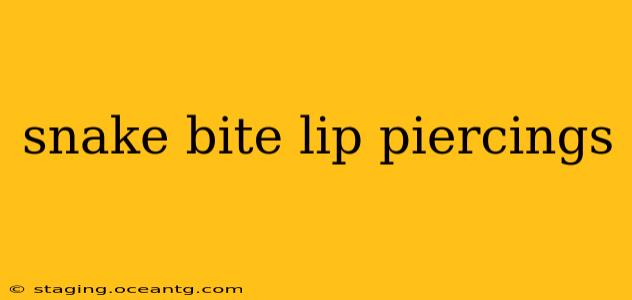Lip piercings are a popular form of body modification, offering a diverse range of styles to suit individual preferences. Among these, snake bites have gained significant traction due to their edgy aesthetic. This guide will explore everything you need to know about snake bite lip piercings, from aftercare to potential risks.
What are Snake Bite Lip Piercings?
Snake bite piercings are a pair of symmetrical piercings located on the lower lip, one on each side of the center. They're positioned slightly off-center, resembling the fangs of a snake – hence the name. Unlike a single lip piercing or a labret piercing, the distinctive placement of the two piercings creates a unique and visually striking look.
How Long Does it Take for Snake Bites to Heal?
The healing time for snake bite piercings is typically 6 to 8 weeks, but complete healing can take up to a year. This timeframe is an estimate, and individual healing speeds can vary based on factors such as aftercare practices, overall health, and body constitution. During the healing process, it's crucial to maintain impeccable oral hygiene and avoid irritating the piercings.
What are the Risks of Snake Bite Lip Piercings?
While generally safe when performed by a licensed professional, snake bite piercings, like any other piercing, carry potential risks:
- Infection: The mouth harbors numerous bacteria, increasing the risk of infection if proper aftercare is not followed. Symptoms of infection include swelling, redness, pain, and pus.
- Damage to Teeth and Gums: Improper placement or jewelry selection can lead to damage to the teeth or gums.
- Nerve Damage: While rare, there's a possibility of nerve damage, which can result in altered sensation or numbness in the lip.
- Allergic Reactions: Allergic reactions to the piercing metal are possible.
- Keloids: Some individuals may develop keloids (raised scars) at the piercing site.
How to Care for Snake Bite Lip Piercings?
Proper aftercare is essential for minimizing risks and ensuring a smooth healing process. This involves:
- Saltwater Rinses: Rinse your mouth with a saltwater solution (1/4 teaspoon of salt dissolved in 8 ounces of warm water) several times a day.
- Gentle Cleaning: Use a soft-bristled toothbrush to gently clean the area around the piercings. Avoid harsh scrubbing or touching the piercings excessively.
- Avoid Irritants: Refrain from smoking, drinking alcohol, and consuming spicy or acidic foods and drinks, as these can irritate the piercings.
- Oral Hygiene: Maintain excellent oral hygiene by brushing and flossing regularly.
- Avoid Touching: Resist the urge to touch or play with the piercings, as this can introduce bacteria.
Can I Get Snake Bites if I Have Sensitive Skin?
Individuals with sensitive skin may experience increased discomfort and a higher risk of irritation during the healing process. It's crucial to discuss your concerns with your piercer, who can advise you on the best approach. Proper aftercare and selecting hypoallergenic jewelry is especially critical for those with sensitive skin.
How Much Do Snake Bite Lip Piercings Cost?
The cost of snake bite lip piercings varies depending on the location and piercer's experience. Expect to pay anywhere from $50 to $150 or more. This price often includes the piercing procedure and the initial jewelry.
What Kind of Jewelry is Best for Snake Bite Piercings?
Typically, labret studs made of biocompatible materials like titanium or surgical steel are recommended for snake bite piercings, especially during the initial healing phase. Avoid using jewelry made of materials that can cause allergic reactions. The size and length of the jewelry should be appropriate for your lip's thickness and anatomy. Your piercer will guide you on the suitable type and size.
This guide provides a comprehensive overview of snake bite lip piercings. Remember to always choose a reputable and licensed piercer for a safe and professional piercing experience. Prioritize proper aftercare to ensure your piercings heal quickly and without complications.
